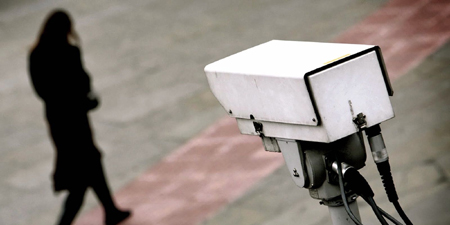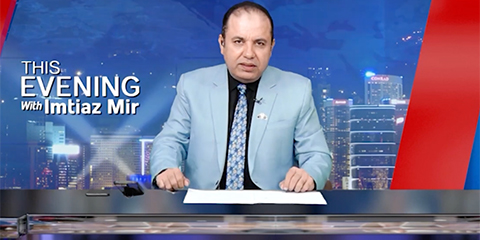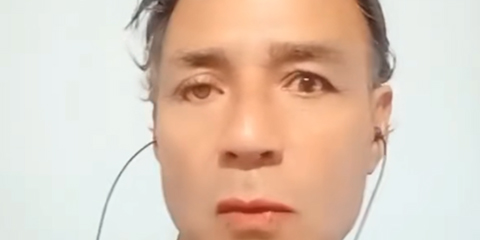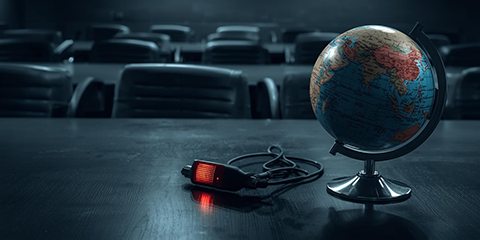
PFUJ calls for end to Impunity for Crimes Against Journalists
November 02, 2025: PFUJ urges Pakistan’s federal and provincial governments to end Impunity for Crimes Against Journalists and ensure their safety and press freedom.
JournalismPakistan.com | Published 8 years ago
Join our WhatsApp channel
ISLAMABAD - The Digital Rights Foundation (DRF) has announced the release of its research titled “Surveillance of Female Journalists in Pakistan”, a pilot study that explores the gendered surveillance that female journalists experience.
The study details the experiences of seven female journalists and the surveillance that they face in the course of their work and beyond. The research focuses on the gendered forms and the different sources of surveillance, including the state, audience members and political groups.
The female journalists interviewed for the study stated that not only were they surveilled by state authorities, but are also subjected to constant social surveillance in the form of abuse on social media - largely directed at their gender and appearance, rather than their work. In addition to mapping the forms of surveillance faced by female journalists, the report also explores the impact that this constant monitoring has, in terms of the psychological toll, self-censorship and retreat from digital spaces.
Nighat Dad, the Founder and Executive Director of Digital Rights Foundation, said that this is an important conversation to have because “gendered surveillance is a free speech issue - it lets women know that they are being monitored, and discourages them from reporting and participating in digital spaces”. The journalists who participated in the research also talked about the toll surveillance can take on their professional and personal lives.
Saba Eitizaz felt that social surveillance online has often had “a tremendous psychological effect [and] I felt violated”. In her experience, said Kiran Nazish, “it’s not just one person telling you that you don’t belong here, it’s a number of people and that constant refrain can be very intimidating and one starts to feel cornered”. The extent of surveillance is so pervasive for journalists that Maria Memon told DRF that “even if I was told that I could tweet about anything without repercussions, I don’t think I would still do it because I don’t think that surveillance is completely avoidable”.
The research aims to add to the conversation around free speech, freedom of the press, surveillance and gender. DRF also aims to mainstream the idea of social surveillance as part of the definition of surveillance - where surveillance is not only carried out by the state, but also by social non-state actors.
Digital Rights Foundation is a research and advocacy based NGO that works on issues of surveillance, privacy, internet governance and online harassment.
Main findings of the study
The report finds, based on qualitative interviews with female journalists working in Pakistan, that the experience of surveillance for female journalists is gendered and is thus different from their male counterparts. While there is no conclusive evidence of whether women face more surveillance, the form that the surveillance takes is in the form of sexualized threats, attacks on character and appearance. This gendered form of surveillance is true for both state and social surveillance. Female journalists were chosen as subjects of this pilot study based on their unique position since journalists have increased visibility in both online and offline spaces.
Through our interviews, DRF identified two main sources of surveillance experienced by female journalists in Pakistan. The first form of surveillance is by the state, government institutions and intelligence agencies. State surveillance is troubling given that it is backed by state machinery which makes for effective, systematic and efficient monitoring. On the other hand, social surveillance, experienced by all the journalists we interviewed, is carried out by the audience, political parties, non-state actors, fellow journalists and personal contacts. Some journalists reported that they experienced more social surveillance than by the state. Thus, it is particularly important to mainstream a definition of surveillance that not only includes state surveillance, but social surveillance as well. DRF observes that the traditional definition of surveillance excludes and silences female experiences of social surveillance.
While some female journalists said that they had not experienced overt government surveillance or monitoring, they had, on the other hand, experienced a lot of social surveillance. Online social surveillance takes on a particularly gendered form and the harassment is often specifically geared towards the person’s sexuality, appearance and character.
Many of female journalists observed that when it comes to controversial topics, both female and male journalists face equal levels of surveillance, however the form of surveillance tends to be gendered. In the experience of some journalists, when the state is attempting to intimidate or discourage them from publishing or reporting particular materials, they often employ sexualized threats or the possibility of revealing facts about their personal lives.
The report also finds that surveillance has a profound psychological impact on female journalists, leaving them paranoid and at times traumatized. Furthermore, many of the journalists said they were guarded about what they said online for fear of surveillance and thus had to self-censor their opinions, and at times their reporting.
DRF found that both the state and media houses need to take concrete steps towards protecting female journalists from the particular kinds of gendered surveillance that they experience. There is a need to identify social surveillance as a serious issue so that steps can be taken to control it and to support journalists who face it on a daily basis. - A DRF media release/Image: Privacy International

November 02, 2025: PFUJ urges Pakistan’s federal and provincial governments to end Impunity for Crimes Against Journalists and ensure their safety and press freedom.

November 02, 2025: Impunity for crimes against journalists deepens worldwide as Pakistan reports a 60 percent surge in attacks and weak enforcement of safety laws.

November 01, 2025: Pakistan Press Foundation reports 137 attacks on journalists in 2025, highlighting rising threats, legal harassment, and censorship on the International Day to End Impunity.

November 01, 2025: A viral Samaa TV clip featuring MNA Sher Afzal Marwat’s crude remarks and Talat Hussain’s laughter raises questions about the declining ethics of Pakistani television.

October 31, 2025: Police foiled a plot to kill DawnNewsTV journalist Tahir Naseer in Rawalpindi after arresting suspects hired for Rs200,000. Naseer says threats followed his reporting.

October 31, 2025: CPJ calls on Pakistan to bring Imtiaz Mir’s killers to justice after the journalist was allegedly murdered by a banned militant group in Karachi.

October 30, 2025: The PFUJ has condemned a fabricated drug case against journalist Matiullah Jan, calling it an attempt to silence him and urging authorities to quash the charges immediately.

October 30, 2025: NewsOne TV remains on air but faces mass layoffs and delayed salaries, exposing Pakistan’s worsening media crisis and financial instability.

November 02, 2025 Independent outlet All About Macau to halt print and online operations amid rising pressure, financial strain, and legal threats, sparking press freedom concerns in the city.

November 01, 2025 Belarus court jails journalist Siarhei Chabotska for extremism and defaming the president, highlighting Minsk’s ongoing crackdown on press freedom.

November 01, 2025 Mexican journalist Miguel Angel Beltran was found murdered in Durango. CPJ urges authorities to ensure justice amid rising violence against journalists in Mexico.

November 01, 2025 UNESCO survey finds one-third of media lawyers cannot effectively defend journalists due to threats, limited resources, and lack of specialization.

October 31, 2025 Radio Free Asia, a US government-funded broadcaster covering tightly controlled Asian media environments, has suspended all news operations after federal funding dried up.